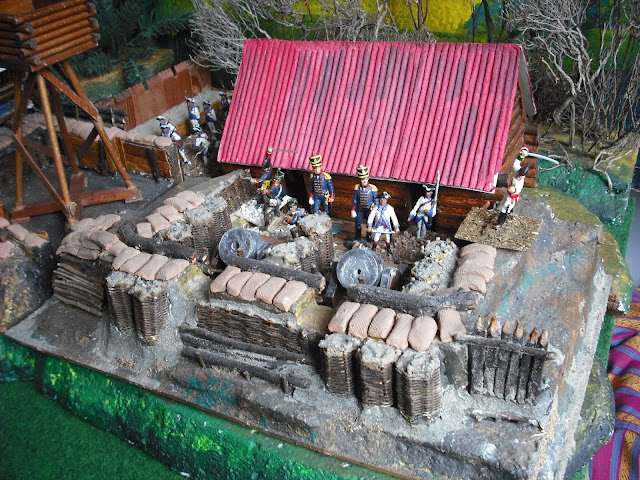In the
WS&S issue 79, there is an article on the Battle of Marengo, by Mr. Eoghan
Kelly.
I have the
Osprey campaign book on Marengo for quite some years now, and one thing that
had struck me was the chapter on “The destruction of the Consular Guard”.
So I was
very surprised to read the following: “Napoleon
committed the Consular Guard, a small but elite force of less than 1000 men.
These formed a square and delayed Elsnitz’s cavalry long enough to prevent
their pursuit of Victor and Lanne. The Guard then retired in good order in a
fighting square and regained the French lines.”
As this was
so different from what I remembered, I took the Osprey Campaign book to check
the chapter : ”Thrown forward by napoleon
in a last bid to stabilise the French right, the Guard(formed in line) were
outgunned by the smaller IR51 Splenyi (nicknamed the ‘Légion Infernale’ by the
French – the regiment s’ two battalions had charged and driven of Murat’s
cavalry shortly before) for about 15 minutes and then crushed by Frimont’s(not Elsnitz) four
squadrons (1. Kaiser light dragoons and Bussy Jäger zu Pferd charged into the rear).
Over four hundred were taken prisoner and four guns were dismounted. About a
hundred guardsmen on the right followed the flag to make their escape into a
small clump”. And there was another
part in the text that struck me : “Napoleon
tried to fire up the battalion of the 72e for one last effort but they
declined. Lannes demanded that Bessiéres tackle Gottesehim front line with the
Guard cavalry to relieve the pressure on his infantry, but the sight of two
battalions of IR28 with muskets ready brought a similar response from the
cavalry commander.”
And one
last thing:” The First Consul wanted
Boudet’s division to cover the retreat, but Desaix knew a renewed battle could
be won”.
In short :
the article : the Guard performed well with almost no losses and Napoleon
master of the situation counter attacked and won. Osprey: the guard was destroyed, Napoleon
wanted to retreat but Desaix convinced him to renew the fight to win the battle.
As I
suppose Mr Kelly didn’t improvise but relied on a source, I think we have here
conflicting information on the battle.
I find it
strange that 200 years after the facts,
there can still be totally different accepted sources. It can only be that chauvinism and
nationalism still colours the view of historians, often misleading the public.
As I also
speak and read French, I have also some French publications on battles of the
Napoleonic period. It struck me their account on battles is often totally
different from the Osprey publications. A few examples: in a publication
“Aspern-Essling: Napoleons first defeat?” . In their view the 1809 battle
wasn’t really a defeat. Strange: what
else can it be if one is driven of the battlefield. On wagram:
in a book on Napoleonic battles in French: the French had many trophies
(flags and guns captured) the Austrians none. Osprey: the Austrian had captured
more trophies than the French and for Napoleon the battle was a draw.
I find it
hard to believe that something that happened two hundred years ago is still
delicate. I think there is no glory in “colouring” the facts. I won’t think less of the French or Napoleon with
the Osprey account. Of course, if the
osprey account isn’t correct, it should be adjusted, but I don’t think there is
no reason for a British historian to “change
the facts” of Marengo. Where my respect crumbles
is for those who change or deny facts to make themselves feel better. Of course, in the past, there were written a
lot of books and studies, that suffer from the same illness. It is sometimes
hard to find sources that have an objective approach.
But it is
not only the French that have tendency to history. See my posting on Waterloo
(saw in a list of publications a book on the Waterloo campaign that’s called “Waterloo:
Four Days that Changed Europe's Destiny”. My God, does the author really
believes that???).
I hope one day, facts will be just that in historical publications.







